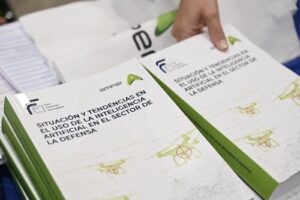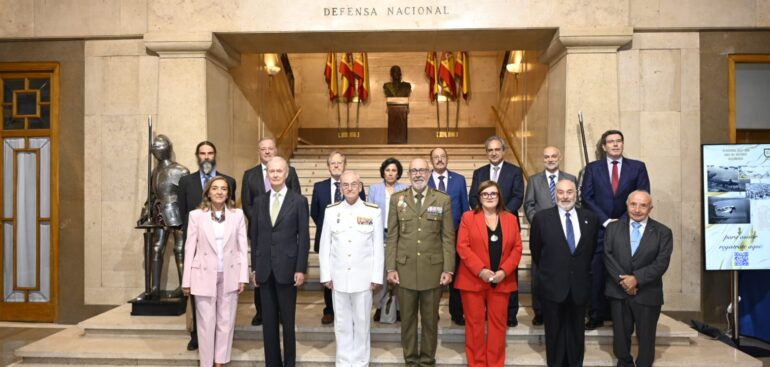- Yesterday, CESEDEN presented the book ‘Situation and trends in the use of Artificial Intelligence in the Defence sector’, a study promoted by the Forum of Innovative Companies (FEI) and the Amper Group, with the collaboration of the Ministry of Defence, the Polytechnic University of Madrid (UPM) and CESEDEN (Higher Centre for National Defence Studies), warns of dependence on non-European hardware and software and proposes a roadmap with a horizon of 2030.
Madrid, 1st October 2025- The global race for dominance in Artificial Intelligence (AI) has fully entered the defence sector. This was confirmed yesterday at the Higher Centre for National Defence Studies (CESEDEN) with the presentation of the book ‘Situation and trends in the use of Artificial Intelligence in the defence sector’, an in-depth study promoted by the Forum of Innovative Companies (FEI) and Grupo Amper.
The event, which brought together military, academic and business leaders, served to present the report’s conclusions. The central message is clear: the European Union faces an ‘urgent and profound’ challenge to avoid falling behind in the adoption of AI in its armed forces, an essential factor for common security and defence.
The significance of the event was marked by the speech given by Admiral General Teodoro López Calderón, Chief of Defence Staff (JEMAD), highlighting the central role of AI for common security and defence.
The opening was led by Lieutenant General Miguel Ballenilla (Director of CESEDEN), Pedro Morenés (President of Grupo Amper) and Carmen Vela (President of the FEI). Gonzalo León (Professor Emeritus at the UPM and member of the Executive Committee of the Innovative Companies Forum), coordinator of the working group responsible for the study, gave a general presentation of the report, detailing how AI is driving an inevitable transition towards the ‘smart battlefield’ in which artificial intelligence takes on a leading role. The institutional closing remarks were given by Teresa Riesgo, Secretary General for Innovation at the Ministry of Science, Innovation and Universities.
Critical Conclusions: Dependency and Challenges
The report emphasises that AI is a ‘dual-natured enabling technology’. However, Europe’s starting position is weak:
Hardware dependency: There is a strong dependency on non-European suppliers, especially for components such as GPUs (Graphics Processing Units) needed to train AI models. This dependency is a critical bottleneck and a geopolitical vulnerability.
Software Dependency: Leadership in the development and use of AI with a global influence on the economies of Western countries remains in the hands of the United States.
Spanish Ecosystem: The Spanish defence industry is rapidly incorporating AI, embedded in weapons systems, decision-making platforms, and military equipment with increasing national developments.
Proposal: The ‘Realistic Scenario’
The study projects a ‘realistic scenario’ for 2030, where the EU would be a relevant power in AI for defence, but without achieving full self-sufficiency. To achieve this, the report outlines a roadmap with ten key recommendations, including:
- Prioritise AI in R&D and military procurement with a dual-use vision.
- Urgently create a common regulatory framework for AI in defence, aligned with European principles.
- Extend the European Chips Act to specifically include the development of AI chips for defence.
- Launch a European Defence Accelerator for disruptive AI start-ups.
(the full ten recommendations are in the report)
The Working Group and Vision for the Future
The colloquium on ‘Prospects for AI in Defence’ was the culmination of the work of a high-level multidisciplinary group coordinated by Gonzalo León and composed of UPM Professor Asunción Gómez-Pérez, UPM Professor Juan Carlos Dueñas, Juan Bosco Morales de los Ríos (CTO Grupo Amper), Luis Fernando Álvarez-Gascón (member of the FEI and CEO of Secure eSolutions GMV), Txema Báez Cristóbal (member of the FEI and NOVADAYS), Luis Guerra (member of the FEI and President of the Spanish Aerospace Platform, Managing Director of Markets, Products & Services and Marketing at the Oesia Group), José María Insenser Farré (member of the FEI and AMETIC IPCEI Chip), David Ramírez Morán (Senior Analyst IEEE-CESEDEN at the Ministry of Defence), Ángel Gómez de Agreda Colonel of the Air and Space Force (R) and Regional Director Middle East at EUROPAVIA) and Luis Vázquez Martínez (member of the FEI and Professor Emeritus at the UCM), all representing academic institutions and leading companies in the technology and defence sector.
The following individuals also collaborated as guests of the Working Group: Major General Guillermo Ramírez Altozano, Head of the Information Systems, Telecommunications and Technical Assistance Headquarters (JCISAT) of the Spanish Army; Brigadier General (R) Roberto Villanueva Barrios (former Chief of Staff of the Joint Cyber Defence Command, head of the CESTIC Cybersecurity Headquarters and chair of the EU Military Committee Working Group) and Major General of the Air and Space Force (R), Juan A. Moliner González (Vice-President of ACAMI).
The conclusion of these experts was unanimous: for the ‘realistic scenario’ to materialise in 2030, the EU must break with national fragmentation, ensure coordinated long-term resources, and exercise strong political will. The aim is not only to achieve the highest possible level of development and use of artificial intelligence in the field of defence, but also to ensure that it is developed in accordance with European ethical principles and values in a context of responsible military use.
Read the full report and download it for free in digital format: AI in Defence

